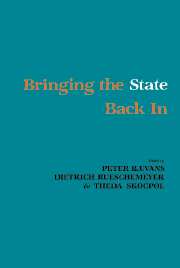Book contents
- Frontmatter
- Contents
- Preface
- Introduction
- Part I States as Promoters of Economic Development and Social Redistribution
- Part II States and Transnational Relations
- 5 War Making and State Making as Organized Crime
- 6 Transnational Linkages and the Economic Role of the State: An Analysis of Developing and Industrialized Nations in the Post–World War II Period
- 7 Small Nations in an Open International Economy: The Converging Balance of State and Society in Switzerland and Austria
- Part III States and the Patterning of Social Conflicts
- Conclusion
- Notes on the Contributors
- Index
5 - War Making and State Making as Organized Crime
Published online by Cambridge University Press: 29 January 2010
- Frontmatter
- Contents
- Preface
- Introduction
- Part I States as Promoters of Economic Development and Social Redistribution
- Part II States and Transnational Relations
- 5 War Making and State Making as Organized Crime
- 6 Transnational Linkages and the Economic Role of the State: An Analysis of Developing and Industrialized Nations in the Post–World War II Period
- 7 Small Nations in an Open International Economy: The Converging Balance of State and Society in Switzerland and Austria
- Part III States and the Patterning of Social Conflicts
- Conclusion
- Notes on the Contributors
- Index
Summary
Warning
If protection rackets represent organized crime at its smoothest, then war making and state making – quintessential protection rackets with the advantage of legitimacy – qualify as our largest examples of organized crime. Without branding all generals and statesmen as murderers or thieves, I want to urge the value of that analogy. At least for the European experience of the past few centuries, a portrait of war makers and state makers as coercive and self-seeking entrepreneurs bears a far greater resemblance to the facts than do its chief alternatives: the idea of a social contract, the idea of an open market in which operators of armies and states offer services to willing consumers, the idea of a society whose shared norms and expectations call forth a certain kind of government.
The reflections that follow merely illustrate the analogy of war making and state making with organized crime from a few hundred years of European experience and offer tentative arguments concerning principles of change and variation underlying the experience. My reflections grow from contemporary concerns: worries about the increasing destructiveness of war, the expanding role of great powers as suppliers of arms and military organization to poor countries, and the growing importance of military rule in those same countries. They spring from the hope that the European experience, properly understood, will help us to grasp what is happening today, perhaps even to do something about it.
- Type
- Chapter
- Information
- Bringing the State Back In , pp. 169 - 191Publisher: Cambridge University PressPrint publication year: 1985
- 1302
- Cited by

